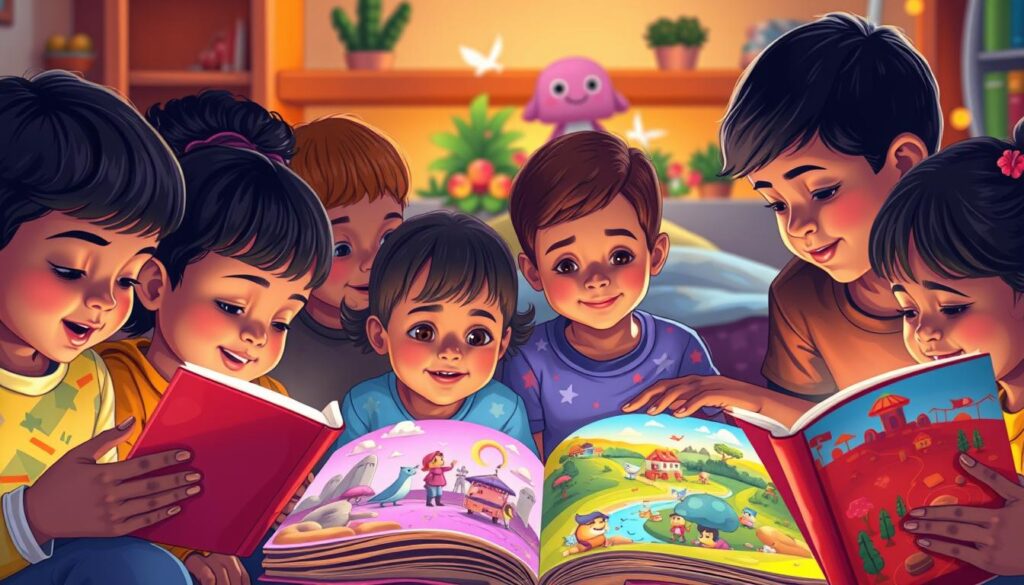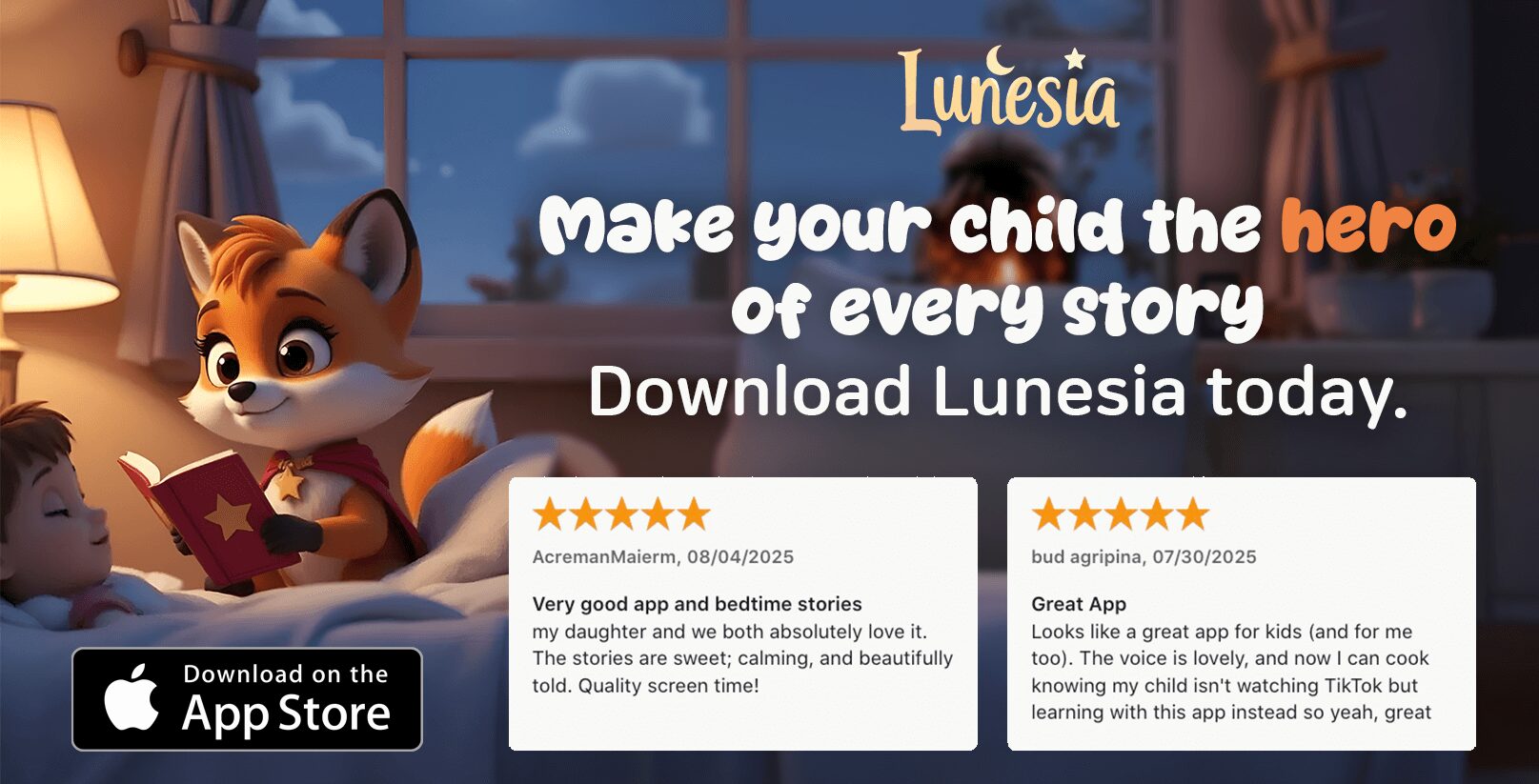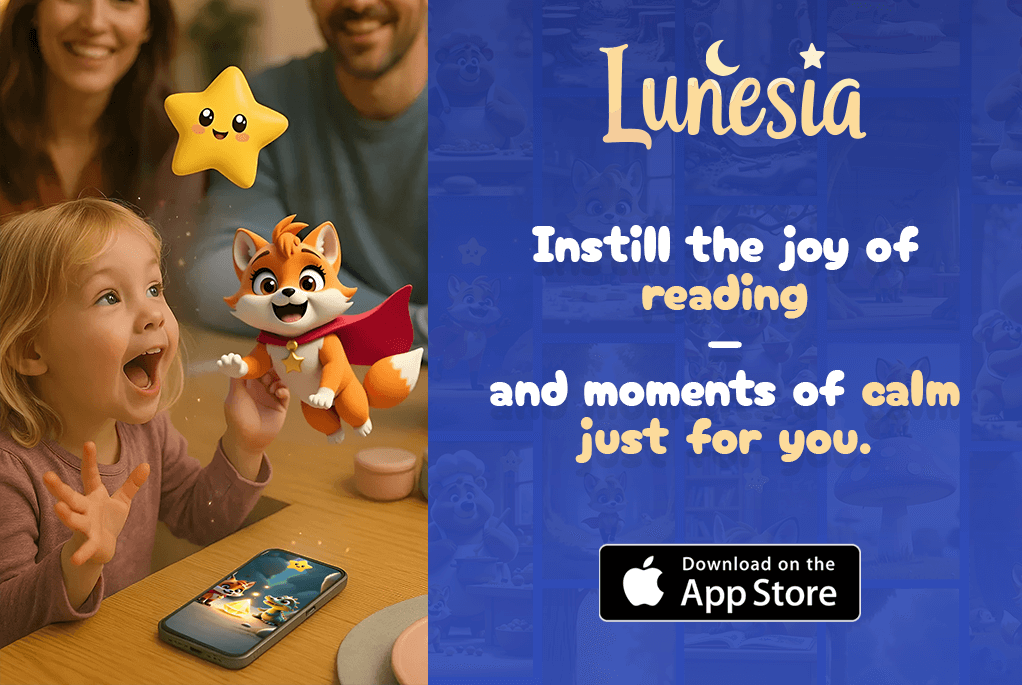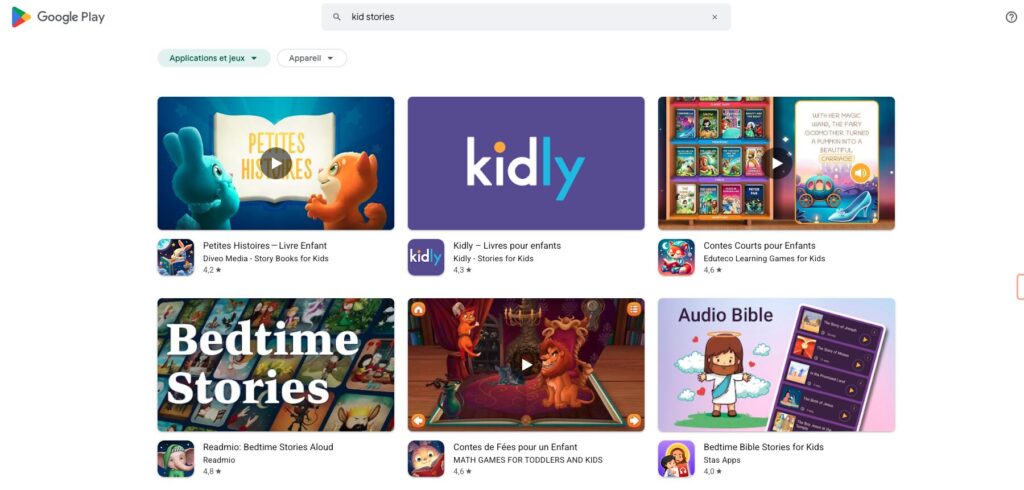As a parent, have you ever wondered how you can instill important life values in your child in a way that’s both fun and engaging?
I’ve witnessed firsthand how the right stories can shape a child’s character and worldview.
Lunesia’s interactive stories stand out as powerful tools for teaching life lessons through engaging narratives that stay with children long after storytime ends.
I’m excited to share with you the top 5 values your child can learn through Lunesia’s unique approach to interactive storytelling, creating magical moments of connection while planting seeds of wisdom.
The Power of Stories in Child Development
I’ve always been amazed at how stories can shape young minds and hearts. As a parent, I’ve witnessed firsthand the transformative power of stories on children‘s lives. Stories aren’t just entertainment; they’re powerful developmental tools that help kids make sense of their world and their place in it.
How Stories Shape Young Minds
When children engage with stories, they’re building neural pathways that support language development, emotional intelligence, and critical thinking skills. Stories give kids a safe space to explore complex emotions and situations before they encounter them in real life. The characters in stories become friends and mentors to children, showing them different ways of being in the world.
Why Interactive Storytelling Makes a Difference
Interactive storytelling takes these benefits even further by inviting children to become active participants rather than passive listeners. When kids can influence the narrative or make choices within a story, they develop agency and critical thinking skills. This interactive approach creates deeper neural connections and improves retention of the lessons embedded within, making reading a more engaging and effective experience over time.
What Makes Lunesia’s Interactive Stories Special

The secret to Lunesia’s success lies in its thoughtful integration of storytelling with child development principles. By combining engaging narratives with interactive elements, Lunesia creates an immersive experience that teaches children valuable life lessons.
The Science Behind Lunesia’s Approach
Lunesia’s approach is grounded in research showing that children learn best when they’re emotionally engaged and actively participating in their learning experience. This is achieved through interactive storytelling, where children are presented with decision points that help them practice value-based thinking in real-time.
The stories are designed to be multi-sensory, engaging different learning styles and making them accessible to children who learn in various ways. This approach not only teaches children about important values but also helps them develop critical thinking skills.
How Lunesia Stories Engage Children Differently
Unlike passive media, Lunesia’s stories create a dialogue that respects children’s intelligence and nurtures their developing moral compass. Children are encouraged to make choices and see the consequences of their decisions, fostering a deeper understanding of the values being taught.
Parents have reported that these stories spark sophisticated conversations, and the complexity of the narratives grows with the child, offering new insights with each reading. This dynamic engagement keeps children interested and invested in the story.
Value #1: Honesty and Trust
Honesty is a fundamental value that Lunesia’s interactive stories aim to instill in children through engaging narratives. As a parent, you’ve likely encountered situations where your child has struggled with telling the truth, and you’re not alone in wondering how to address this issue effectively.
Lunesia’s approach to teaching honesty is multifaceted, using stories that not only convey the importance of truthfulness but also explore the reasons behind dishonesty. For instance, the classic tale of “The Boy Who Cried Wolf” is a powerful narrative that demonstrates how lying can destroy trust.
Stories That Teach the Importance of Truth
Stories like “The Boy Who Cried Wolf” are timeless examples of how dishonesty can lead to severe consequences. In this story, a boy repeatedly cries out for help, claiming a wolf is attacking his sheep, even when there is no wolf. Eventually, when a wolf really appears, the boy’s cries for help are ignored, and his sheep are devoured.
Lunesia’s interactive stories take this teaching a step further by allowing children to experience the consequences of their choices within the narrative. This interactive element helps kids understand the value of honesty in a more engaging and memorable way.
| Story Element | Teaching Moment | Child’s Learning Outcome |
|---|---|---|
| The boy cries wolf when there’s no wolf. | Lying leads to loss of trust. | Understand the consequences of dishonesty. |
| The boy’s cries for help are ignored when a wolf appears. | Consequences of previous lies. | Recognize the importance of trustworthiness. |
| Interactive choices: to lie or tell the truth. | Experiencing the impact of choices. | Develop decision-making skills based on honesty. |
How Honesty Builds Character in Children
By teaching children the value of honesty, we help them build a strong character foundation. Honesty fosters trust, not just with others, but also with oneself. When children learn to be truthful, they develop a sense of integrity that guides their actions and decisions.
Lunesia’s stories about honesty don’t just tell children to “always tell the truth”; they explore the nuances of why honesty matters through relatable scenarios. By engaging with these stories, kids learn that honesty is not just a rule, but a strength that contributes to their developing identity.
Value #2: Empathy and Compassion
Lunesia’s interactive stories offer a compelling way to teach children the value of empathy and compassion. In today’s world, where digital interactions are increasingly common, nurturing empathy in kids is more important than ever. Stories provide the perfect vehicle for this essential emotional education.
Understanding Others’ Feelings
Empathy is about understanding and sharing the feelings of others. Lunesia’s empathy-centered stories take children on journeys where they experience the world through another character’s perspective. This helps kids understand that others have feelings, thoughts, and experiences that may differ from their own.
The interactive nature of these stories is particularly effective for teaching empathy because children must consider how their choices affect other characters. By doing so, they learn to recognize and understand different emotions, building their emotional vocabulary.
Strengthening Social Connections
Empathy strengthens social connections by fostering a sense of community and understanding among people. When children engage with Lunesia’s stories, they become more attuned to others’ feelings, which can lead to more compassionate and meaningful relationships.
| Benefits of Empathy | How Lunesia’s Stories Help |
|---|---|
| Understanding others’ feelings | Characters share their thoughts and emotions |
| Building emotional vocabulary | Stories cover a range of emotions and experiences |
| Strengthening social connections | Children learn to consider others’ perspectives |
By teaching empathy through engaging stories, Lunesia helps children develop essential life skills that will benefit them in their personal and social lives.
Value #3: Perseverance and Resilience
One of the most significant values we can instill in our children is the ability to persevere through challenges. In a world where instant gratification is often the norm, teaching kids to keep going even when things get tough is more important than ever. Lunesia’s interactive stories provide a powerful tool for nurturing this essential life skill.

Lunesia’s stories about resilience are particularly effective because they don’t shy away from challenges. Instead, they acknowledge that difficult things happen and focus on how we respond to them. This approach helps children understand that setbacks are a natural part of life and that they have the power to overcome them.
Stories of Overcoming Challenges
The stories in Lunesia’s collection are designed to show characters facing and overcoming obstacles. These narratives allow children to experience setbacks within the safety of a story, building their emotional resilience for real-life challenges. By witnessing characters they admire persevering, kids learn valuable lessons about grit and determination.
- Characters in the stories face relatable challenges that kids can understand and empathize with.
- The interactive elements require children to make multiple attempts to overcome obstacles, mirroring real-life experiences.
- These stories introduce the concept of a “growth mindset,” showing characters who view challenges as opportunities to learn.
Building Grit Through Interactive Narratives
The interactive nature of Lunesia’s stories is key to building grit in children. By presenting obstacles that require multiple attempts to overcome, these narratives teach kids that success often comes after repeated efforts. This approach not only builds resilience but also helps children develop a love for learning and improvement.
Parents have reported that their children reference these resilience-building stories during difficult times, such as homework assignments or learning new skills. This shows how effectively Lunesia’s stories can translate into real-life applications, helping children develop the perseverance they need to succeed.
Value #4: Kindness and Generosity
As parents, instilling kindness and generosity in our kids can have a lasting impact on their lives and the lives of those around them. I’ve always believed that kindness is a superpower we can help our children develop – one that benefits both the giver and the receiver in profound ways. Lunesia’s interactive stories beautifully illustrate how small acts of generosity can create ripple effects that transform communities.
One of the most compelling aspects of these stories is how they show kindness as a choice we make, especially when it might be difficult or when others aren’t watching. For instance, the story of “A Glass of Milk” teaches children the value of kindness and how it can come full circle in unexpected ways. A poor boy was offered a glass of milk by a girl when he was hungry, and years later, when she was in need, she received kindness in return, symbolized by the doctor’s bill being ‘Paid in full, with a glass of milk.’
The Ripple Effect of Kind Actions
The narratives help children understand that kindness isn’t just about grand gestures – it’s about the everyday moments where we choose to see and respond to others’ needs. The interactive elements allow children to experience firsthand how different choices around kindness affect both the story outcomes and how they feel about themselves. These stories cleverly address the common barriers to kindness that children face – like peer pressure, fear, or simply not noticing opportunities to help.
How Generosity Cultivates Happiness
Parents have shared how these stories have inspired spontaneous acts of kindness from their children, from sharing toys to comforting upset friends. What’s particularly powerful is how these stories connect kindness to a child’s developing sense of identity – helping them see themselves as “the kind of person who helps others.” The diverse scenarios presented in these stories help children recognize opportunities for kindness in their own lives that they might otherwise miss.
These kindness-focused narratives create natural opportunities for families to discuss and practice generosity together, strengthening both values and relationships. By engaging with Lunesia’s stories, children can develop a strong foundation in kindness and generosity, setting them up for a lifetime of positive relationships and personal fulfillment.
Value #5: Confidence and Self-Belief
Nurturing confidence in kids is about more than just boosting their ego; it’s about helping them understand and trust themselves, as seen in Lunesia’s stories. Confidence is a vital value that can significantly impact a child’s ability to navigate life’s challenges. Lunesia’s interactive stories are designed to foster this confidence by presenting characters who face various obstacles and learn to overcome them.
Discovering Inner Strength Through Stories
Lunesia’s confidence-building stories are remarkable for how they distinguish between genuine self-belief and mere bravado or arrogance. The narratives help children understand that confidence comes from facing challenges, making mistakes, and discovering that they can recover and learn. For instance, the story of “Elephant and Friends” teaches kids that being different isn’t a weakness but a unique strength that can be a solution to problems others can’t solve.
The interactive elements of these stories allow children to experience the courage it takes to make choices even when the outcome is uncertain—a cornerstone of genuine confidence. By engaging with these stories, kids can develop a stronger sense of self-belief, learning that their unique qualities have value.
Nurturing Self-Esteem in Children
Parents have shared how Lunesia’s stories have given their children the language to express their doubts and fears, which is the first step toward overcoming them. These confidence-focused narratives create natural opportunities for families to celebrate each child’s unique strengths and support their growth through challenges. By doing so, children learn to trust themselves and develop a positive self-image.
By incorporating stories like “Elephant and Friends” into their reading routine, parents can help their children develop the confidence needed to thrive. These stories not only entertain but also educate, providing valuable lessons on the importance of self-belief and inner strength.
How Parents Can Maximize Learning from Lunesia’s Stories
By engaging with Lunesia’s stories in a thoughtful way, parents can help their children derive valuable life lessons. The key is to go beyond just reading the stories together.
To maximize the learning potential, parents can start by asking open-ended questions after reading a story. This encourages children to think critically about the plot and characters.
Discussion Questions to Ask After Story Time
Questions like “What would you have done if you were in the character’s shoes?” or “How do you think they felt when that happened?” invite children to process the story on a deeper level. This helps kids develop empathy and understand different perspectives.
- Ask about the storyline and characters’ actions
- Explore how characters might advance the plot
- Discuss why characters acted in certain ways
Connecting Story Lessons to Real-Life Situations
Parents can also connect the story lessons to real-life situations their child encounters. For example, “Remember how Maya in the story felt when no one would share? How do you think your friend feels now?” This helps children see the relevance of the story to their own lives.
| Story Lesson | Real-Life Connection |
|---|---|
| Sharing with others | Playing with friends at school |
| Being honest | Admitting mistakes at home |
| Showing empathy | Comforting a friend who’s upset |
The Values Child Can Learn from Stories Beyond the Top 5
The depth and diversity of Lunesia’s interactive stories mean that children can learn a wide range of values and skills. While we’ve focused on five core values, these narratives actually nurture a much broader spectrum of important qualities in kids.
One of the significant benefits of Lunesia’s stories is their ability to foster cultural awareness and appreciation for diversity. These narratives beautifully weave in different traditions, perspectives, and ways of life, exposing children to the richness of our global community. As I reflect on these stories, I’m impressed by how they present diversity not as something to merely tolerate, but as something that enriches our shared human experience.
Cultural Awareness and Diversity
Lunesia’s stories serve as a window to the world, allowing children to explore different cultures and traditions. By engaging with these narratives, kids can develop a deeper understanding of the people and world around them. As children learn about various cultures, they begin to appreciate the unique customs and practices that make our world so diverse.
| Cultural Elements | Benefits for Children |
|---|---|
| Exposure to different traditions | Promotes understanding and appreciation |
| Diverse perspectives and ways of life | Encourages empathy and broadens worldview |
| Rich cultural heritage | Fosters a sense of global citizenship |
Problem-Solving and Critical Thinking
The interactive elements in Lunesia’s stories also help children develop problem-solving and critical thinking skills. As kids work through challenges and consider different approaches, they learn to think creatively and make informed decisions. This skill-building is essential in today’s complex world, where children will face numerous challenges as they grow.
As we reflect on the values and skills that Lunesia’s stories impart, it’s clear that these narratives offer a wealth of learning opportunities for children. By engaging with these stories, kids can develop a strong foundation for lifelong learning and growth.

Measuring the Impact: How Stories Shape Long-Term Development
Understanding how stories influence our children’s long-term development is both fascinating and complex. As parents, we’re eager to know if the stories we’re sharing are making a difference in our kids’ moral growth.
Research on Storytelling and Character Development
Research consistently shows that stories have a profound impact on character development. Narrative experiences shape neural pathways in developing brains, with children who engage with stories rich in moral content showing greater empathy and prosocial behavior.
Signs Your Child is Internalizing Positive Values
So, how can you tell if your child is internalizing the positive values from the stories they’re experiencing? Look for signs such as story references in everyday situations, unprompted acts of kindness or honesty, and changes in their language around emotions and values.
| Signs of Internalization | Description |
|---|---|
| Story References | Children connecting real-life scenarios to story lessons |
| Unprompted Acts | Acts of kindness, honesty, or perseverance mirroring story themes |
| Language Changes | Expanded vocabulary for discussing feelings and choices |
Conclusion: Nurturing Values Through the Magic of Stories
As we conclude our journey through Lunesia’s interactive stories, it’s clear that these tales offer more than just entertainment for kids. They are powerful tools for teaching valuable values that shape children’s characters and life skills. By embracing these stories, parents can create meaningful family experiences that last a lifetime. I encourage you to make storytelling a central part of your family’s journey, nurturing your child’s understanding of what truly matters.
FAQ
How do Lunesia’s interactive stories help my kid develop essential life values?
Lunesia’s interactive stories teach kids important life values like honesty, empathy, and kindness through engaging narratives and relatable characters, helping them develop a strong moral compass.
What makes Lunesia’s approach to teaching values different?
Lunesia’s interactive stories combine entertainment and education, making it easier for kids to absorb and apply values like perseverance and self-belief in real-life situations.
Can Lunesia’s stories help my kid overcome fears and anxieties?
Yes, Lunesia’s stories are designed to help kids face and overcome their fears, building confidence and resilience through positive role-modeling and gentle guidance.
How can I, as a parent, maximize the learning experience for my kid with Lunesia’s stories?
You can enhance the learning experience by asking discussion questions after story time, connecting the lessons to real-life situations, and encouraging your kid to reflect on what they’ve learned.
Are Lunesia’s stories suitable for kids of all ages?
Lunesia’s stories are designed for kids of various ages and developmental stages, with content tailored to meet the unique needs and interests of different age groups.
How can I track my kid’s progress and see the impact of Lunesia’s stories on their development?
You can monitor your kid’s progress by observing their behavior, attitude, and emotional intelligence, and by using the guidance provided by Lunesia to assess their internalization of positive values.




